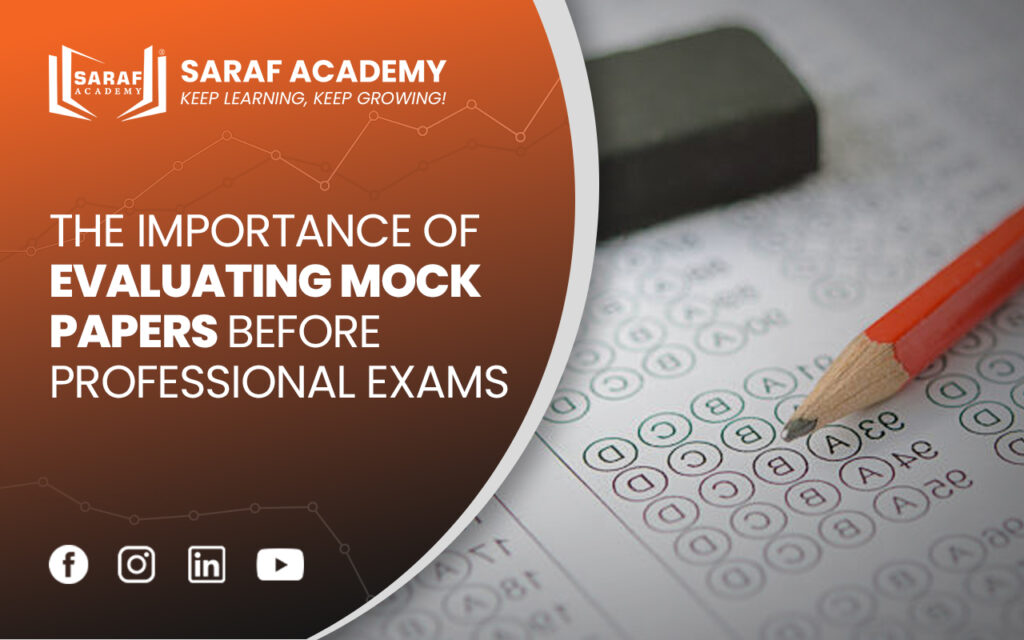

A Complete Guide for ACCA, CMA, CA, CFA, CPA & Other Professional Students
Professional exams aren’t just tests of knowledge – they’re pressure cookers that demand precision, strategy, speed, and emotional control. And in this entire journey, mock papers are the single most underrated weapon students ignore… and then regret.
But here’s the twist:
Just writing mocks doesn’t make you exam-ready. Evaluating them properly does.
Mock + honest evaluation = improvement.
Mock without evaluation = illusion.
Let’s break down why evaluation is the real game-changer – and how top-performing students use this one habit to score 70+, 80+, even 90+.
Why Writing Mocks Alone Is Not Enough
Most students treat mock papers like gym selfies – they look at the attempt, feel good, and move on.
But the real value lies in the post-mock analysis.
Because writing mocks only tells you:
- “I attempted a paper.”
But evaluating mocks tells you:
- “What do I always do wrong?”
- “Why did I waste 20 minutes here?”
- “Why do I misread this type of question?”
- “Why does my brain freeze after Question 3?”
- “Why do I lose marks even when I KNOW the concept?”
Mock evaluation is basically holding up a mirror that says:
“Hey, look. This is the version of you that will walk into the exam hall. Can we fix these cracks before it’s too late?”
The 4 Core Benefits of Proper Mock Evaluation
1. You Discover Your Invisible Weak Spots
Every student has “blind spots” – things they think they know, but don’t.
Mock evaluation reveals:
- recurring errors
- half-knowledge zones
- chapters you think you’ve mastered
- careless mistakes that silently eat 10–20 marks
As Prakash Sir always emphasizes:
“Mock checking is the moment of truth. Don’t skip the moment where improvement actually happens.”
2. Your Time Management Improves Dramatically
Most students fail not because they don’t know the answers –
but because they run out of time.
Evaluating your mocks shows:
- where you slow down
- which questions take too long
- whether your writing speed matches exam expectations
- where panic kicks in
This lets you redesign your question order strategy – something toppers swear by.
3. You Learn to Think Like an Examiner
When you evaluate your own answers (or compare them with official answers), you start noticing:
- how marks are allocated
- what keywords get scored
- what structure examiners prefer
- what they penalize instantly
This transforms your approach from
“writing what I know”
to
“writing what fetches marks.”
That’s a power shift.
4. It Builds Exam Stamina & Mental Toughness
Mock evaluation teaches you:
- how you behave under pressure
- what your stress triggers are
- when your focus drops
- how long you can stay in peak mental mode
Over time, your nervous system becomes “exam-conditioned.”
You walk in calmer, sharper, and far more confident.
A Realistic Micro Case-Study (Why Evaluation Matters More Than Writing)
Student A
- Wrote 8 mocks
- Checked only 2
- Scored 59 in the final exam
Student B
- Wrote 3 mocks
- Evaluated all 3 in detail
- Created correction notes
- Scored 76 in the final exam
Why the difference?
Because writing mocks builds familiarity.
But evaluating mocks builds mastery.
Most toppers will tell you they write fewer mocks, but evaluate every single one like a crime scene investigation.
The Complete 7-Step Method to Evaluate Mocks Like a Topper
Step 1: Check Your Paper Within 24 Hours
Your memory of your thought process is fresh.
You catch patterns faster.
Step 2: Compare Your Answer With the Expected Format
Look for:
- missing keywords
- incorrect structure
- weak explanations
- incomplete workings
This is where the “aha” moments happen.
Step 3: Mark Every Mistake With a Reason
Not just the mistake.
But the reason behind the mistake:
- conceptual gap
- calculation slip
- misreading
- rushing
- overconfidence
This gives you “mistake awareness.”
Step 4: Categorize the Errors Into Three Buckets
- Knowledge errors → need concept revision
- Exam technique errors → need format/speed practice
- Careless errors → need mindfulness
This categorization alone can boost your score by 10–20 marks.
Step 5: Build a “Mistake Notebook”
Write down every recurring mistake.
This becomes a personal blueprint of:
- your weak points
- your triggers
- your habits
- your predictable slips
Before the exam, reading this is more valuable than reading the entire syllabus again.
Step 6: Create a Strategy for the Next Mock
Based on the evaluation, tweak your:
- question order
- writing style
- time split
- approach to tricky chapters
This creates compounding improvement.
Step 7: Re-attempt Just the Questions You Got Wrong
Within 48 hours.
This seals the correction.
This is how toppers eliminate repetitive mistakes.
How Many Mocks Should You Write and Evaluate?
For professional exams like ACCA, CMA, CA, CFA, CPA –
this is the sweet spot:
**Write 3–5 mocks.
Evaluate all 3–5 mocks thoroughly.**
10 poorly evaluated mocks won’t match the power of
3 mocks + deep evaluation.
The “Golden Rule”
If you don’t evaluate your mocks,
you are simply rehearsing your mistakes for exam day.
Evaluation is where you turn weaknesses into marks,
panic into strategy,
and knowledge into performance.
Final Thought
Professional exams are not a test of memory alone.
They’re a test of decision-making under pressure.
Mock papers teach you “how to write the exam.”
But the evaluation teaches you “how to score in the exam.”
And as Prakash Sir always points out gently but firmly:
“Your improvement lives in your checking.
Don’t rush past the most important part.”
Evaluate your mocks like your future depends on it –
because honestly, it just might.




